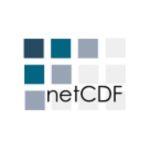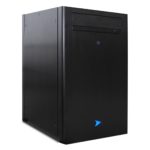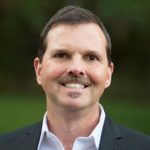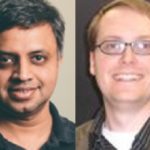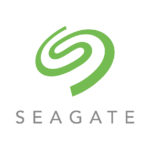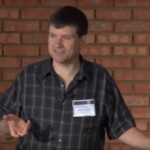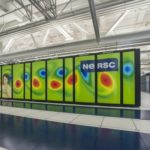In this RCE Podcast, Brock Palen and Jeff Squyres speak with the authors of NetCDF. NetCDF is a set of software libraries and self-describing, machine-independent data formats that support the creation, access, and sharing of array-oriented scientific data. “Unidata’s Network Common Data Form (netCDF) is a set of software libraries and machine-independent data formats that support the creation, access, and sharing of array-oriented scientific data. It is also a community standard for sharing scientific data.”
Archives for July 2017
Velocity Micro Accelerates HPC Desktops
Today Velocity Micro rolled out a suite of new workstation offerings designed for CAD design, 3D rendering, multimedia creation, and scientific calculation. Headlining the refreshed category are an AMD Epyc workstation with up to 64 physical cores, new Intel Xeon Scalable Processor offerings, and Threadripper, AMD’s newest Ryzen processor now available for pre-order. “Our heritage is deeply rooted in building ultra-performance workstation PCs, extending back to when I founded the company twenty years ago,” said Randy Copeland, President and CEO of Velocity Micro. “By refreshing these offerings and making AMD’s Threadripper processors available for preorder, we’re reasserting our commitment to this category and this customer with the most complete line of custom workstation solutions available anywhere.”
Nick Nystrom Named Interim Director of PSC
Nick Nystrom has been appointed Interim Director of the Pittsburgh Supercomputing Center. Nystrom succeeds Michael Levine and Ralph Roskies, who have been co-directors of PSC since its founding in 1985. “During the interim period, Nystrom will oversee PSC’s state-of-the-art research into high-performance computing, data analytics, science and communications, working closely with Levine and Roskies to ensure a smooth and seamless transition.”
Interview: Hot Interconnects Conference to Focus on Next-Generation Networks
The Hot Interconnects Conference is coming up Aug. 28-30 in Santa Clara. To learn more, we caught up with Program Chairs Ryan Grant and Jitu (Jitendra) Padhye. “Hot Interconnects brings together members of the industrial, academic and broader research community to unveil the very latest advances in network technologies as well as to discuss ideas for future generation interconnects. Unlike other conferences, Hot Interconnects is focused on only the latest most topical subjects and concentrates on technologies that will be available for deployment in the near future.”
Podcast: Andrew Ng on why AI is the New Electricity
In this AI Podcast, Andrew NG from Deeplearning.AI describes why he thinks Artificial Intelligence is the new electricity. “Just as today I see a lot of S&P 500 CEOs that wish they had started thinking about their Internet strategy or their mobile strategy five years earlier, I think that in the future we’ll see a lot of leaders that will wish they had started to think about their AI strategy earlier,” said Ng.
Update: Approximately 100 Seagate ClusterStor Employees to Move to Cray in Strategic Transaction
Seagate is getting out of the HPC business. Today Cray announced that it has entered into partnership agreement with Seagate centered around ClusterStor high-performance storage. “In 2012 Cray became our first OEM and has continued over the years to be our largest and most strategic ClusterStor partner,” said Ken Claffey, vice president and general manager, Storage Systems Group at Seagate. “As the leader in the supercomputing market, Cray will be a great home for the ClusterStor, employees, customers and partners.”
Speeding Up Big Data Analysis With Intel MKL and Intel DAAL
“New algorithms that can query massive amounts of data an draw conclusions have been developed, but these algorithms need to be optimized on the underlying hardware. This is where the expertise of vendors who develop the hardware can add tremendous value. Optimizing the underlying libraries that can execute with a high degree of parallelism will definitely lead to improved performance for the software and productivity gains for the organization.”
CERN openlab Joins Intel Modern Code Developer Challenge
James Reinders writes that a new Intel Modern Code Developer Challenge has teamed up with CERN openlab. “It is always an exciting time when I get to announce a Modern Code Developer Challenge from my friends at Intel, but it is even more special when I get to announce a collaboration with the brilliant minds at CERN. Beginning this month (July 2017), and running for nine weeks, five exceptional students participating in the CERN openlab Summer Student Programme are working to research and develop solutions for five modern-code-centered challenges.”
LANL’s Herbert Van de Sompel to Receive Paul Evan Peters Award
“For the last two decades Herbert, working with a range of collaborators, has made a sustained series of key contributions that have helped shape the current networked infrastructure to support scholarship,” noted CNI executive director Clifford Lynch. “While many people accomplish one really important thing in their careers, I am struck by the breadth and scope of his contributions.” Lynch added, “I’ve had the privilege of working with Herbert on several of these initiatives over the years, and I was honored in 2000 to be invited to serve as a special external member of the PhD committee at the University of Ghent, where he received his doctorate.”
DOE Helps Tackle Biology’s Big Data
Six proposals have been selected to participate in a new partnership between two U.S. Department of Energy (DOE) user facilities through the “Facilities Integrating Collaborations for User Science” (FICUS) initiative. The expertise and capabilities available at the DOE Joint Genome Institute (JGI) and the National Energy Research Scientific Computing Center (NERSC) – both at the Lawrence Berkeley National Laboratory (Berkeley Lab) – will help researchers explore the wealth of genomic and metagenomic data generated worldwide through access to supercomputing resources and computational science experts to accelerate discoveries.

